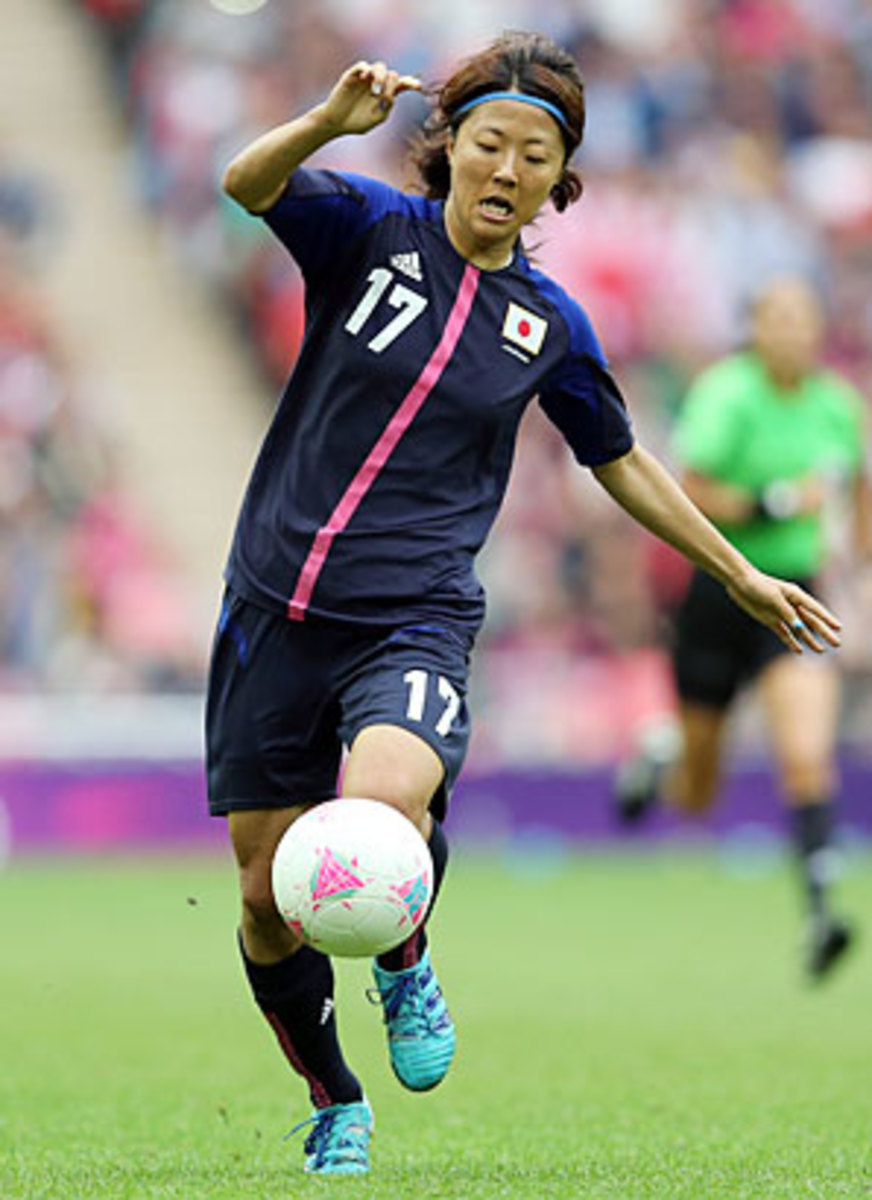Japan chases history, respect in women's soccer final against U.S.
"It probably felt today the same way as teams feel when they play Spain or Barcelona, where it was very difficult to get possession and when we got possession we found it very difficult to keep it," said Tom Sermanni, the coach of the Australian women's national team after a 3-0 friendly defeat in Japan last month.
Barcelona did not win the UEFA Champions League, but Spain triumphed at Euro 2012. In Thursday's final of the 2012 Olympics against the United States at Wembley, Japan is aiming to follow the Spanish and add one glorious title to another.
For the Asians, one double is off the cards but one is not. After the men lost 3-1 to Mexico in a semifinal Tuesday, Japan can no longer win gold in both genders, but Nadeshiko (the name comes from Yamato Nadeshiko, another name for a goddess in Japanese mythology and a poetic name for Japanese women and is also a pink flower) can certainly join the U.S. (1996, '99) as the only nations to be the Olympic and World Cup champions at the same time.
If so, it will cap a momentous 13 months for women's soccer in Japan during which it has made international headlines on and off the field. The senior side defeated the United States in the final of the World Cup in July 2011 to give a country still reeling from the aftermath of a devastating earthquake and tsunami four months earlier a much-needed boost. The likes of Homare Sawa and Nahomi Kawasumi returned home from Germany as heroines.
The manner of their leaving for London in July was less feted but more reported. As the pilot turned off the seat belt sign after take-off from Narita Airport en route for Heathrow, the men's soccer team was relaxing in business class while the women were back in economy. Though Japan FA officials were quick to stress it was "premium" economy, a starker image of gender discrimination in sport is hard to imagine.
Coach Norio Sasaki has tried to play down the story in hopes it would disappear. "...I don't know what's going to happen," he said earlier this week when reminded his team was upgraded after the World Cup success. "And the players and myself don't really care what seats we have." Sasaki, in charge of the women's team since 2008, managed to change the subject though not in the way he would have liked.
His comments after a 0-0 tie with South Africa in the final match of the Olymopics group stage sparked another international debate. With two wins at the start of the tournament, Japan had booked a quarterfinal place with a game to spare. As the coaching staff wanted to stay in the city of Cardiff for the quarterfinal game, he told his players not to go for a win that would have necessitated a move to Glasgow. The Japan Times called the strategy "disgraceful," and in the wake of the disqualification of eight female badminton players from London for trying to lose final group games in order to gain an advantage in the knockout stages, it certainly caused controversy.
Sasaki later sought to clarify his position. "We never set out with the intention for playing for a draw. From the start we were playing for three points. I made a decision based on the way the game was going and with time running out."
Cardiff was secured though nobody expected Brazil to appear in the Welsh capital after a surprise defeat at the hands of England. It turned out, however, that Marta and Co. were no problem for a Japanese side that had still yet to concede a goal in 360 minutes of play.
The next day, the men moved into the last four in similar style. Faced with Spain in the opening game, the Samurai Blue won 1-0, impressive enough against the Europeans, but it was as comprehensive 1-0 win as you will see this year. The media talked as if the result was a shock, but those in Asia felt the win was in line for a team expected to be going places. Eyebrows were raised but jaws were not dropped.
The soccer future is bright in Japan. An extensive youth development system put in place by the Japan FA 20 years ago has been bearing fruit, and while most of the money goes to the men, the women have had access to fine facilities, increasingly good coaches, regional training centers and the JFA's National Elite Academies. The number of registered female players has grown from 2,290 in 1980 to 25,268 at the end of 2009, and the two-tier L-League, founded in 1989, is going reasonably well.
While American women may look on the L-League, which benefited hugely in terms of exposure and popularity following last summer's success, with envy following the recent demise of the WPS, it is no paradise. It is not professional -- the handful of full-time players are with 2011 champions INAC Kobe. Those at other clubs need "real" jobs to earn a living.
Even so, the soccer they produce is some of the best ever seen in the world of women's soccer and features the same highly technical, passing game that is becoming the hallmark of Japan around the world.
There is set to be a clash of styles in London against a more physical and direct American team. Both will see reasons for encouragement in the other's semifinal performance as well as much to admire. Now it is all about the final. The United States wants revenge but Japan wants to make history and add gold to the World Cup.






